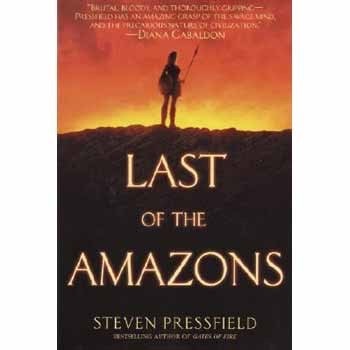










In historical fiction, the stakes are becoming ever higher. More and more first-rate novels in the genre appear monthly and aficionados can afford to pick and choose. Steven Pressfield has established some copper-bottomed credentials with the vigorously written epics "Gates of Fire" and "Tides of War", and his new novel, "Last of the Amazons" continues this winning streak. Pressfield's colourful, operatic style may not have the nuance of such progenitors of the genre as Robert Graves, but his populist approach really pays dividends--and without any sacrifice of quality writing. Popular does not have to mean crass, and Pressfield's prose is lively and intelligent, always conjuring for the reader a brilliantly realised picture of the ancient world with maximum vividness.
Theseus is Pressfield's protagonist, and the year is 1250 BC; setting out on his dangerous odysseys, the celebrated Athenian monarch (best known for his combat with the monstrous Minotaur) has many close calls with death before taking a fateful decision: he marries the fierce Amazon queen Antiope. His action has disastrous consequences: the fearsome tribe of warrior women who spurn contact with men form a massive army and march to Athens to exact a bloody revenge. Their defeat, of course, was written in the stars, but for a remarkable period, their actions transfixed the Attic world before catastrophe overtook them.
"Last of the Amazons" has a whole slew of virtues, and it's hard to know where to begin in detailing them. The characterisation, for instance: Theseus is realised with imagination and authority, and his mindset is a clever synthesis of modern and ancient consciousness. The politics, too, are cannily realised, as is the minutiae of everyday life in a much-mythologised era. But it's the bloody action that, perhaps, most compels--this is not a book for the squeamish. Stick with the slightly artificial opening chapters, and you will find yourself swept up in a tale of truly epic proportions.--"Barry Forshaw"

